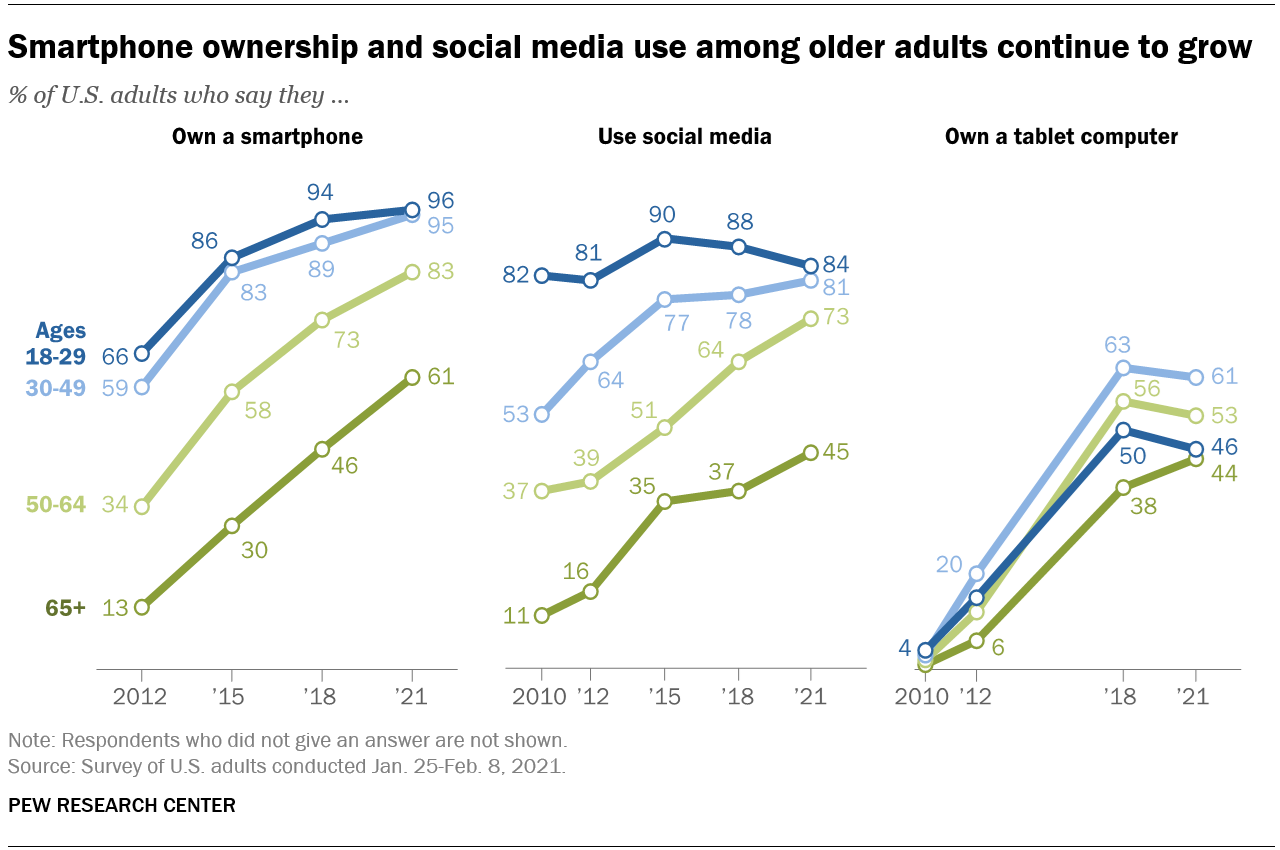Image by Freepik
Smartphones are now indispensable tools in our daily lives, but they pose significant security risks, particularly for elderly users. Astonishingly, over 61 percent of seniors 65 and above have embraced this technology, integrating mobile devices into their daily lives.

Image taken from Pew Research Center
However, the rapid adoption of smartphones among older people has outpaced their understanding of cybersecurity. While seniors are keen to stay connected and engaged through their phones, many are alarmingly unaware of existing cyber threats.
Horror stories abound, from retirees losing their life savings to cunning phishing schemes to individuals suffering identity theft. These incidents underscore a critical gap in digital literacy that this guide seeks to address.
Embracing Basic Security Measures
Here are some basic security measures to keep older adults safe as they connect digitally to the world:
Educate about strong passwords and lock screens
The first line of defense against unauthorized access to your smartphone is a robust password or PIN. As a senior, you may find it hard to remember complicated passwords. That's why it's common to use simple combinations like "1234" or "0000," which are easy to decode after a few tries.
It's best to set a password that contains a mix of letters, numbers, and symbols. Equally important is enabling the lock screen feature. It ensures that your phone requires authentication every time it's accessed, protecting your data if lost or stolen.
Do regular software updates
Researchers have found that users often intentionally postpone software updates. They do it as a coping mechanism to mitigate the frustration and discomfort of adapting to new features.
Usually, they fear that this latest update might disrupt their familiar usage patterns. This reluctance may also stem from the annoyance of the update process and the belief that their device's functionality is already optimal. As such, they view updates as unnecessary disruptions.
However, companies like Apple and Samsung have periodic updates for a reason. Primarily, it's done to address newly discovered bugs and improve their phones' security features. The persistent notification for a software update on your smartphone might seem bothersome, but consistently dismissing it can lead to vulnerabilities. These updates are crucial as they enhance your device's security and functionality.
Purchasing an outdated phone that no longer receives security updates significantly compromises your cybersecurity. Devices without regular security patches are far more susceptible to cyberattacks, putting your data at serious risk.
Whenever possible, get inexpensive Samsung smartphones for seniors that can still receive security updates.
Download apps from trusted sources
Only install applications from reputable digital stores. These platforms vet apps for security issues before making them available for download. Avoid getting apps from third-party sources, as they are more likely to contain malware or malicious software.
Review app permissions
Apps often request access to various phone features or data, such as contacts, cameras, or locations. Carefully consider whether an app truly needs access to these features to function and review the permissions it requests before installation. Check the permissions of your installed apps and revoke any unnecessary ones.
Manage location services
Location services can be a double-edged sword. While they are helpful for navigation, someone can exploit them to track your movements. Evaluate which apps need to use your location and restrict location access for those that don't.
Turn off location services when not in use. Not only can it enhance your privacy, it also saves battery life.
Beware of phishing attacks
Phishing scams, common in emails or messages, mimic legitimate companies to steal personal information. Be cautious of unsolicited communications asking for sensitive data or encouraging you to visit suspicious links. Verify the source before responding or providing any data.
Enable two-factor authentication (2FA)
Two-factor authentication is also great for boosting smartphone security. Such a feature requires you to provide a second form of verification in addition to your password. The verification can be a code sent to your phone or an authentication app.
Enabling 2FA for your important accounts, like email and banking, significantly reduces the risk of unauthorized access.
Use secure Wi-Fi connections
Unsecured public Wi-Fi networks pose a significant risk, as cybercriminals can easily exploit them to intercept data. Avoid conducting sensitive transactions or accessing personal accounts over public Wi-Fi.
Learn how you can leverage a virtual private network (VPN) service. These software systems hide your internet connection and protect your data on public networks.
Backup your data
Regularly backing up your phone's data ensures that you retain important information if your phone is compromised or damaged. Consider cloud services or external storage devices to maintain a backup of your contacts, photos, documents, and other valuable data.
Know current threats
Cyber threats constantly evolve, so staying informed about the latest security risks and prevention strategies is crucial. Follow reputable technology news sources, subscribe to cybersecurity newsletters, or participate in community programs that offer digital literacy training.
If you're unsure about your smartphone's security settings or suspect a security breach, seek advice from someone you trust. Many community centers and senior organizations offer workshops and one-on-one sessions to help elderly individuals understand and manage their digital devices securely.
Practice Digital Due Diligence
Empowering yourself with the knowledge and tools to protect your smartphone is essential in today's digital age. By doing so, you can lessen the risk of falling prey to cyber threats and enjoy a safer online experience.
Don't let your age become a target for nefarious individuals. Protect yourself by practicing smartphone security.
Leave a Comment